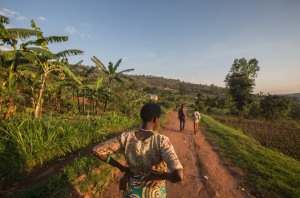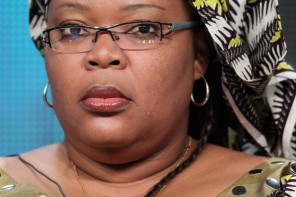This has got to be the best quote yet to run in anyone’s Congo stories. From Stephanie McCrummen, who has been doing stellar work from this region for the Washington Post for years; she visited a town where a Congolese politician was announcing the Rwandan troops’ arrival to help Congolese soldiers. To a quiet crowd, the politican says,
“Aren’t you happy?” the politician shouted at the villagers, who mostly stared, seeming to calculate what fresh calamity or possible hope the operation might imply. “Can’t you clap? The president of the republic has decided to end the war!”
Congo and Rwanda are supposed to join forces and intimidate, or shell, a Hutu militia known as the FDLR out of the bush. The FDLR is the latest incarnation of a rebel group whose roots go back to the Rwandan genocide, when its Hutu leaders and killers fled to Congo to escape the new government and international justice and all manner of things in between. They’ve been hiding in the Congolese bush for 15 years.
That means they’re really good at it. Rwanda tried to get them out in the late ’90s; it invaded Congo, but said it didn’t, in 1996. It left, with a shruggish, “Okay, you got us, we were there,” in 2002. But the FDLR stayed.
The UN has been trying to disarm the FDLR peacefully since then. In 6 years, it’s talked about 6,500 fighters into going home (about double the number, if you include their families). Home, you say? Yes: Remember, these FDLR are Rwandans. What the whole world wants is them to put down their guns and go back to Rwanda, which promises not to prosecute most of them for genocide, and gives them a little life start-up money.
The catch? They don’t want to go. Some of them are afraid of Rwanda; others are afraid of their commanders, who don’t want them to leave. Still others have married Congolese women and settled into life in Congo. Their lives aren’t in Rwanda any more.
And that’s one of the concerns about this new operation. Congo has lots of Hutu, too. And the FDLR is known as militia that sets up shop in the middle of a village. They don’t live in army barracks and go to the mess hall for food; the commandeer villages, tax the population, control the mines, and go home at night to their wives. So using an army to get them out of the bush might mean a lot of civilian casualties, human rights groups say.
There’s another problem, and that’s the Congolese Army. Rwanda’s new disarmament partner is pretty universally acknowledged as one of the worst armies in Africa. It loots and rapes; it has no real equipment, and no way to get around, except on foot. It’s rather a disaster of a fighting force–but it has friends.
Who, you say? Oh yes. The FDLR.
The Congolese Army and the FDLR have been mutually satisfied business partners for years. The FDLR lets the Army in on some of the mining action. Besides that, one Army colonel told me last summer, some of the Army are also Hutu. “They’re brothers,” he said.
Which brings us to the other rebel group, the CNDP, led until recently by Congolese Tutsi Laurent Nkunda. The UN accused Rwanda of propping Nkunda and his army up with money, uniforms and even soldiers; that army, in turn, is constantly in Human Rights Watch press releases for slaughtering civilians in villages it overruns. They’re viscious, and good: they continually defeat and humiliate the Congolese Army. Their existential justification? To fight–you got it–the FDLR.
This is what people mean when they say the Congo conflict has its roots in the Rwandan genocide. One rebel group comes directly out of the genocide; the other constitutes an ethnic fighting force to counter it. If this were anywhere else in the world, the Army might be able to take care of the job. But this is Congo, where even the streets of the capital–way on the other side of one of Africa’s biggest countries–feel like they run by their own logic, not the will of a leader or the force of the law. And that’s the part of the country where there are streets.
Meanwhile, the rest of the world seems to have changed the rules of the game. Rwanda swept in, at Congo’s invitation, in late January. It arrested Nkunda, though it says he’s not being held jail. It’s unclear whether Rwanda is going to extradite Nkunda to Congo–Congo wants to try him for his nastiness, but Rwanda’s holding back, leaving some observers wondering whether Rwanda’s seemingly stern move is actually a way of bailing its Old Reliable out.
And the newest twist? Apparently, according to Stephanie’s piece, there is now a “small U.S. military team” in eastern Congo. No one knows yet what they’re doing.
Ah, Congo.
I close with another quote from Stephanie’s piece, known to folks like me as absolute journalism gold:
“The game has changed. Now we are supposed to attack the FDLR, which has been helping us,” said an exasperated Jean Linalyabuta, a Congolese company commander who said he had worked with the Hutu militias since 1996.
“And I tell you the truth: We have already identified areas where FDLR are, but they are within the population. If we get orders, we’d be obliged to attack everyone.”
PS: I apologize to the Washington Post for linking to the story via the Seattle Times, but WaPo, your web site is slow here. Also, in these trying times, let’s give a littler paper a piece of the clickability action.





“And I tell you the truth: We have already identified areas where FDLR are, but they are within the population. If we get orders, we’d be obliged to attack everyone.” LOLLLLLL Sounds like typical COngolese commander. Imagine someone who dares to say this to the population he’s supposed to protect!
Du jamais vu au Congo!